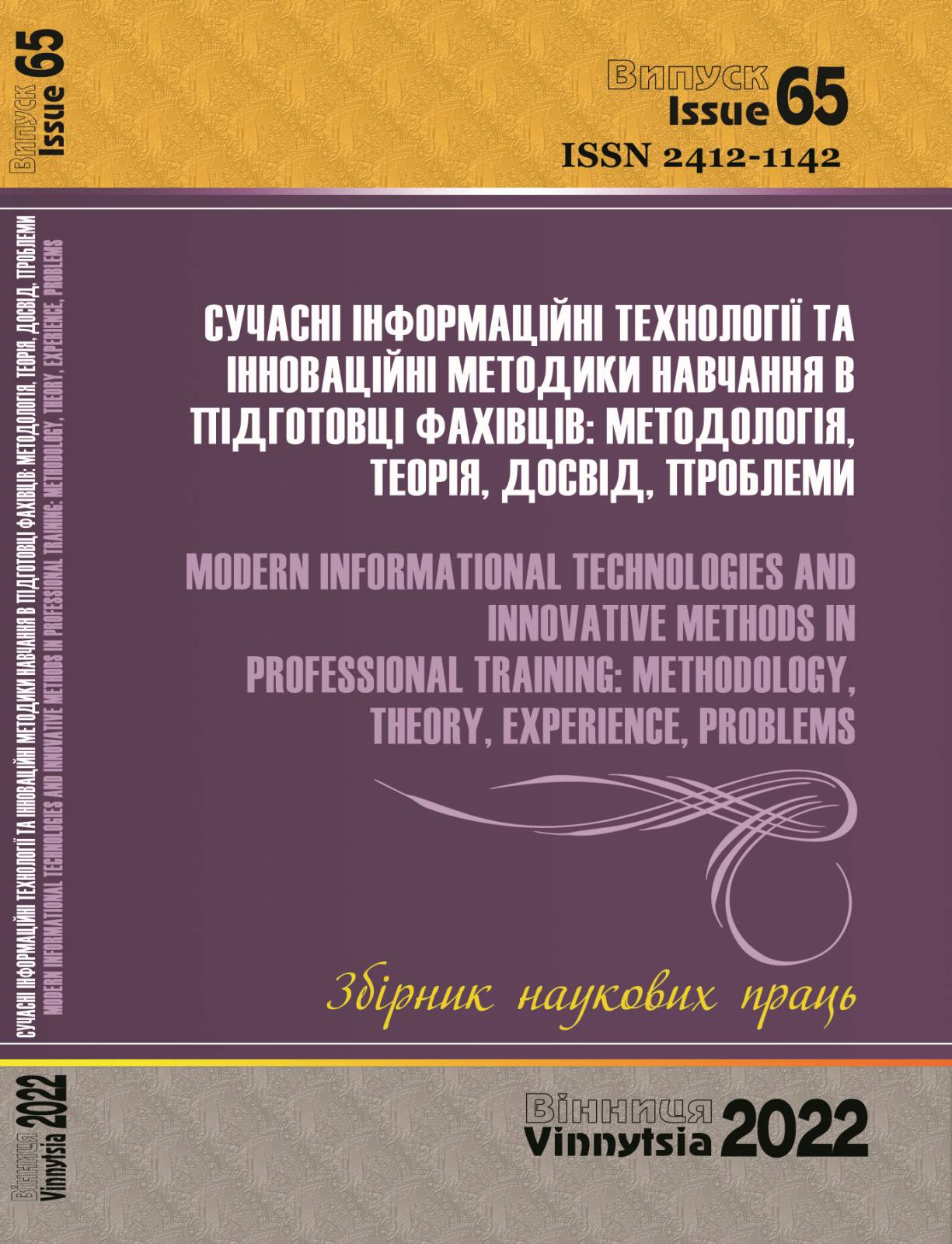DIGITALIZATION OF GENERAL SECONDARY EDUCATION IN UKRAINE (END OF THE 20th CENTURY - 21st CENTURY)
DOI:
https://doi.org/10.31652/2412-1142-2022-65-40-57Keywords:
digitization; computerization; computer-oriented learning tools; digital technologies; secondary educationAbstract
One of the main tasks of the general secondary education institution is to prepare the
younger generation for life creativity in the conditions of a dynamic, rapidly changing,
technologically saturated space. The analysis of the source base showed that the problem of
digitization of Ukrainian general secondary education because of the processes of computerization,
the introduction of distance learning, training, and professional development of pedagogical workers
is not sufficiently disclosed in national research. The purpose of the article: to carry out an analysis
of the processes and results of computerization and digitalization, the introduction of distance
learning in general secondary education institutions, and the training and development of the digital
competence of pedagogical workers in Ukraine. It was established that the quantitative and
qualitative provision of computer equipment and Internet connection in Ukraine shows positive
dynamics. At the moment, 99.8% of Ukrainian schools are equipped with computers and Internet
connections. In the process of digitalization of general secondary education, projects are being
implemented with the participation of government institutions and the world's leading IT companies:
Intel and Microsoft Ukraine projects, Ukrainian projects "Smart Kids", "Cloud Services in
Education", "Ukrainian School Online", and also SELFIE, "Cyphrogram" for teachers, etc. The
peculiarities and problems of the introduction of distance and blended learning in schools in the
conditions of a global pandemic are characterized. Current mechanisms for the development of the
digital competence of Ukrainian teachers are analyzed. It was established that studying the opinion
of teachers, as key players in the implementation of distance learning and the development of the
information and digital environment of educational institutions, determining their level of digital
competence and digital readiness should become a strategic task of the new Ukrainian school.
Downloads
References
Сухіх, А. С. (2013). Деякі аспекти використання засобів ІКТ в навчальному процесі на основі
здоров’язбережувального підходу. Проблеми сучасної педагогічної освіти. Сер.: Педагогіка і психологія,
( 3), 207–212.
Лаврентьєва, Г. П. (2009). Психолого-ергономічні вимоги до застосування електронних засобів навчання.
Інформаційні технології і засоби навчання, 5 (13). Доступно:
https://journal.iitta.gov.ua/index.php/itlt/article/download/85/71.
Ifenthaler, D., Hofhues, S., Egloffstein, M., Helbig, Ch. (Eds.). (2021). Digital Transformation of Learning
Organizations. Springer Cham. doi: https://doi.org/10.1007/978-3-030-55878-9.
Lewin, C., Smith, A., Morris, S., Craig, E. (2019). Using Digital Technology to Improve Learning: Evidence
Review. London: Education Endowment Foundation. Retrieved from:
Bottino, R. (2020). Schools and the digital challenge: Evolution and perspectives. Educ Inf Technol, 25, 2241–
doi: https://doi.org/10.1007/s10639-019-10061-x.
Pettersson, F. (2021). Understanding digitalization and educational change in school by means of activity theory
and the levels of learning concept. Educ Inf Technol, 26, 187–204. doi: https://doi.org/10.1007/s10639-020-
-8.
Viberg, O., Mavroudi, A., Bälter, O., Mohammad, M. Kh. (2020). Validating an Instrument to Measure
Teachers’ Preparedness to Use Digital Technology in their Teaching. Nordic Journal of Digital Literacy, 15 (01).
doi: 10.18261/issn.1891-943x-2020-01-04.
Torres-Hernández, N., Gallego-Arrufat, MJ. (2022). Indicators to assess preservice teachers’ digital competence
in security: A systematic review. Educ Inf Technol. doi: https://doi.org/10.1007/s10639-022-10978-w.
Биков, В. Ю. (2010). Проблеми і цілі інформатизації освіти України. Освіта в інформаційному
суспільстві: матеріали Всеукраїнської науково-практичної конференції, 13–19. Доступно:
https://lib.iitta.gov.ua/1166/.
Гуржій, А. М., Биков, В. Ю., Гапон, В. В., Плескач, М. Я. (2005). Інформатизації і комп’ютеризації
загальноосвітніх навчальних закладів України - 20 років. Комп’ютер у школі та сім’ї, 5, 3–11. Доступно:
https://core.ac.uk/download/pdf/32307615.pdf.
Литвинова, С. Г. (2020). Цифровий поступ закладів загальної середньої освіти – дистанційна
форма навчання. Вісник Національної академії педагогічних наук України, Том 2, No 2, 1–5. Доступно:
https://visnyk.naps.gov.ua/index.php/journal/article/view/83/111.
Яцишин, А. В. (2021). Теоретико-методичні основи використання цифрових відкритих систем у
підготовці аспірантів і докторантів з наук про освіту. (автореф. дис. д-ра пед. наук). Інститут
інформаційних технологій і засобів навчання НАПН України, Київ. Доступно:
https://lib.iitta.gov.ua/724320/.
Кобильник, Т. П. (2005). Розв’язування задач з параметрами з використанням комп’ютера. Теорія та
методика навчання математики, фізики, інформатики, Вип. V, Т. 1, 134–139.
Пещенко, Н. К., Костеневич, М. И. (2008). Компьютерные технологии на уроках алгебры в 8–10 классах.
Теорія та методика навчання математики, фізики, інформатики, Вип. VII, Т. 1, 18–21.
Шишкіна, М. П. (2004). Основні етапи розвитку та використання комп’ютерно-орієнтованих засобів
навчання. Наук. зап. КІТЕП. Псих.-пед. пробл. удоскон. проф. підготов. фахівців сфери туризму в умовах
неперервн. освіти, 4, 42–44.
МОН України (2021). Освіта в незалежній Україні: розвиток та конкурентоспроможність : інформаційно-
аналітичний збірник. Київ: МОН України. Доступно: https://cutt.ly/lLtwf15.
Intel становится партнером национального проекта «Открытый Мир». Доступно:
http://iteach.com.ua/student_computer/?pid=2137.
Використання сучасних ІКТ у навчально-виховному середовищі 1 учень : 1 комп’ютер на базі шкільних
нетбуків INTEL. Доступно: http://1to1.iteach.com.ua/.
Украинские IT-компании представили базу электронных учебников E-pidruchnyky и систему управления
финансами класса ParCon. Доступно: http://itc.ua/news/ukrainskie-it-kompanii-predstavili-bazu-elektronnyih-
uchebnikov-e-pidruchnyky-i-sistemu-upravleniya-finansami-klassa-parental-control.
Овчарук, О. В., Іванюк, І. В. (2022). Результати онлайн-опитування «Готовність і потреби вчителів щодо
використання цифрових засобів та ІКТ в умовах карантину: січень-лютий 2022 : аналітичний звіт. Київ:
ІЦО НАПН України. Доступно: https://lib.iitta.gov.ua/730808/.
Кремень, В. Г. (Ред.). (2021). Національна доповідь про стан і перспективи розвитку освіти в Україні.
Київ: КОНВІ ПРІНТ. doi: https://doi.org/10.37472/NAES-2021-ua.
Downloads
Published
Issue
Section
License
Copyright (c) 2022 Світлана Литвинова , Майя Мар’єнко, Юлія Носенко , Аліса Сухіх , Анна Яцишин

This work is licensed under a Creative Commons Attribution 4.0 International License.

